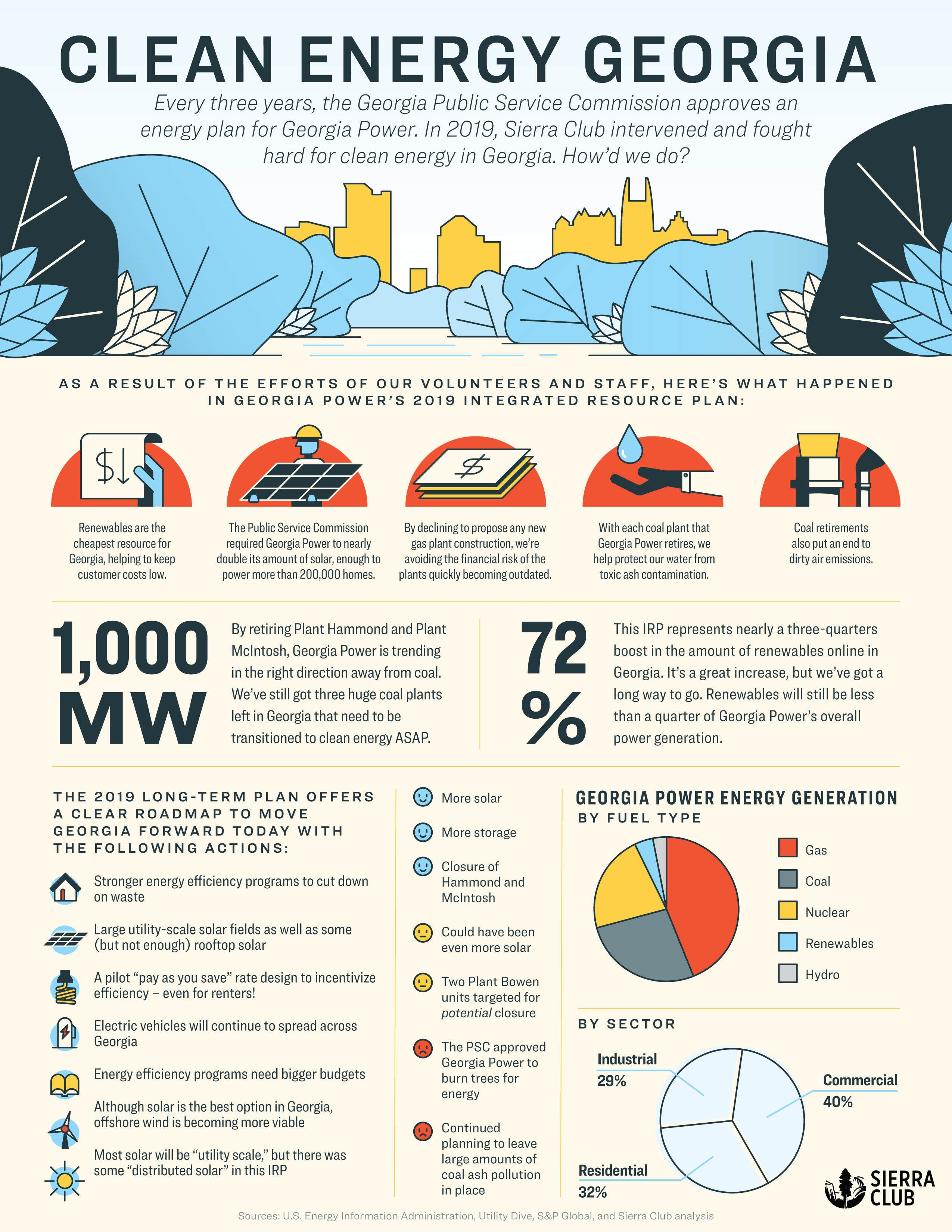
The Beyond Coal Campaign is Sierra Club’s largest campaign, focused on both climate change and saving money for customers of electric utilities. The campaign is aggressively pushing to replace coal-generated electricity with clean energy by mobilizing grassroots activists around the country to advocate for the retirement of coal plants. We are also increasingly focused on preventing new fossil fuel burning power plants from being built.
In Georgia, this work has tremendous urgency due to the heavy historical reliance of Georgia Power on burning coal. To this day, the company (whose service territory covers nearly the entire state) continues to have an ownership stake in three extremely large coal power plants, among the largest emitters of carbon in the United States.
Connect with Georgia's Beyond Coal Campaign
Find us on Facebook, Twitter, and sign up for our online campaign.
Georgia's Three Coal-Fired Power Plants
Plant Bowen
- 3,232 MW coal plant in Bartow County near Cartersville
- Began operating in 1971
- 100 percent owned by Georgia Power
- Due to the high volumes of coal ash stored near Plant Bowen on the banks of the Etowah River, boron exceeds safe levels in groundwater monitoring wells by up to 10 times, and antimony exceeds safe levels by up to 3 times. The natural geography around Plant Bowen is particularly unsuited for storing toxic coal ash.
- In 2002, a four-acre sinkhole beneath its coal ash pond caused two million pounds of coal ash (260 pounds of arsenic) to enter a tributary of the Etowah River
Plant Wansley
- 1,744 MW coal plant in Heard County near Carrollton.
- Began generating power in 1976
- Majority owned by Georgia Power, although 30 percent is owned by Oglethorpe Power, 15 percent by the Municipal Electric Authority of Georgia (MEAG), and a nominal portion is owned by the City of Dalton.
- This plant is more of an asset than a liability, operating less than 20 percent of the time, and well overdue to retire.
- Sitting on the banks of the beautiful Chattahoochee River, Plant Wansley’s coal ash is contaminating the surrounding groundwater. Nearby cobalt levels in groundwater are 10 to 20 times the EPA Regional Screening Level for cobalt.
- Wells near Plant Wansley also have elevated levels of boron, suggesting a coal ash-related source. Other pollutants found at unsafe levels include lithium, radium, and sulfate.
Plant Scherer
- 3,440 MW coal plant in Monroe County near Juliette.
- One of the largest coal-fired power plants in the United States, and frequently tops the list of America’s largest carbon emitters.
- Began generating power in 1982, making it Georgia Power’s newest coal plant.
- Co-owned in a complicated arrangement, with Oglethorpe Power owning the largest share (30 percent), a Florida-based utility called NextEra owning over 25 percent, Georgia Power owning around 23 percent, and then smaller shares owned by MEAG, JEA (based in Jacksonville, FL), and the City of Dalton.
- By spreading ownership of its mammoth coal boilers across so many owners, it will be challenging to shutter Plant Scherer, but the growing outrage about coal ash contaminating local groundwater is certainly calling attention to the toxic legacy of burning coal. Cobalt concentrations are frequently 10 or 20 times higher than EPA’s health-based standard.
Coal Ash
One byproduct of years of burning coal in Georgia is millions of tons of coal ash is being stored across the state. Coal ash has been found to contain a long list of hazardous pollutants, including arsenic, boron, cadmium, chromium, lead, radium, selenium and more, which can severely harm human health, fish and wildlife.
Many of the locations where coal ash is stored in Georgia have been found to be unsafe. According to a 2018 study by Earthjustice and the Environmental Integrity Project, the groundwater near 11 of 12 coal ash storage sites has been found to contain toxic pollutants.
While coal ash has been stored across Georgia in unsafe ways for years, the issue is getting widespread attention as folks who have seen water in their communities contaminated are taking action and fighting back.
The Sierra Club is working with our allies across the state to push for legislation that addresses the coal ash issue. Several bills dealing with coal ash have advanced in 2021, including proposals to establish new water monitoring regulations near storage sites and to require better public notice to affected communities.
We are also pushing the Georgia Environmental Protection Division to safely and thoroughly excavate existing coal ash ponds across Georgia. Click here to read our letter urging Georgia EPD to open an extended public comment period and hold public hearings on plans to shut down coal ash ponds at Plants Hammond, Bowen, and Wansley.
Clean Energy Alternatives
We have the solutions to move Georgia beyond coal, while preserving jobs in frontline communities
Solar power harnesses our most abundant renewable resource: the sun
- Georgia is among the top ten solar producing states. Solar panels built in Georgia are shipped all over the United States
- According to the Solar Foundation’s 2020 report, solar jobs grew in Georgia by 30%, adding over 1,000 new jobs to Georgia’s economy
When the sun doesn’t shine, stored energy can be used
- Stored solar energy supplements when demand is high, like keeping lights on through the night
- The solar industry and solar storage industry can work symbiotically, creating jobs in both sectors
Wind energy is cheap, and Georgia should invest
- Offshore wind is cheap to build and presents job opportunities
- Offshore wind is more economical in Georgia than in other places because of our shallow seas and heavy breezes
- The manufacture, construction, installation, and maintenance of offshore wind farms will create jobs
- Offshore wind energy can be effectively harnessed when Georgia is at peak-energy consumption
- The summer months bring sea breezes to Georgia’s shores, and by replacing peak electricity generation with zero-fuel alternatives, we can drive down energy bills all while avoiding fossil fuel emissions and pollution.
Georgia Power's 2019 Rate Case
Every three years, Georgia Power files a “rate case” with state regulators to ask for adjustments to the fees and charges it imposes on its customers. In December 2019, the regulators at the Public Service Commission granted Georgia Power’s request to raise its base rates over the next three years as well as impose a fee to be used for coal ash cleanup.
As a result, Georgia Power customers will see their monthly base fee (which is unaffected by the amount of electricity uses) increase by $2 in 2021 and another $2 in 2022. The coal ash cleanup fees have already begun showing up on customers’ bills in 2020.
All told, Georgia Power expects to receive a $1.8 billion increase in revenue from 2020 to 2022. This includes $525 million for coal ash cleanup costs.
In March 2020, the Sierra Club filed an appeal of the PSC’s decision to give Georgia Power those hundreds of millions of dollars for coal ash cleanup. We contend that Georgia Power failed to provide enough information about how this money would be spent to justify charging their customers.
The appeal is working its way through the courts. Watch this space and our social media pages (see below) for updates on the appeal process.
Georgia's Long-Term Energy Plan
In 2019, Sierra Club and allied organizations pushed the Georgia Public Service Commission (PSC) to include more clean energy in Georgia Power’s latest long-term energy plan. This plan is updated every three years.
As a result of our efforts, the latest version of the plan requires Georgia Power to retire two coal-fired power plants (Plants Hammond and McIntosh), as well as to double its solar energy production and increase the amount of renewable energy in its portfolio by 72 percent.
Part of the latest long-term plan establishes a pilot program that incentivizes energy efficiency in Georgians' homes. Click to read our letter to the PSC lauding the pilot program but asking that it be a foundation for a much more ambitious approach.

Georgia's Public Service Commission
Utilities in Georgia, including electric, telecom and fracked gas companies, are regulated by the Georgia Public Service Commission. This five-member body is elected to provide oversight of these industries and protect the public’s interest. The commission’s members are elected statewide in partisan elections to serve staggered six-year terms. Though commissioners are elected in statewide elections, each commissioner represents a specific area of Georgia as seen in this PSC District Map.
The members of the PSC are:
- Jason Shaw, District 1 (South Georgia), Republican
- Commissioner since 2019, term ends Dec. 31, 2026
- Contact: jshaw@psc.ga.gov; Twitter: @ShawForGeorgia
- Tim Echols, vice chairman, District 2 (Central/East Georgia), Republican
- Commissioner since 2011, current term ends Dec. 31, 2022
- Contact: techols@psc.state.ga.us; Twitter: @TimEchols
- Fitz Johnson, District 3 (Metro Atlanta), Republican
- Commissioner since 2007, current term ends Dec. 31, 2022
- Contact: fjohnson@psc.ga.gov; Twitter: @FriendsForFitz
- Lauren “Bubba” McDonald, District 4 (North/Northeast Georgia), Republican
- Commissioner since 2009, current term ends Dec. 31, 2026
- Contact: lmcdonald@psc.state.ga.us; Twitter: @BubbaPSC
- Tricia Pridemore, chair, District 5 (West/Central Georgia), Republican
- Commissioner since 2018, current term ends Dec. 31, 2024
- Contact: tpridemore@psc.state.ga.us; Twitter: @TPridemore